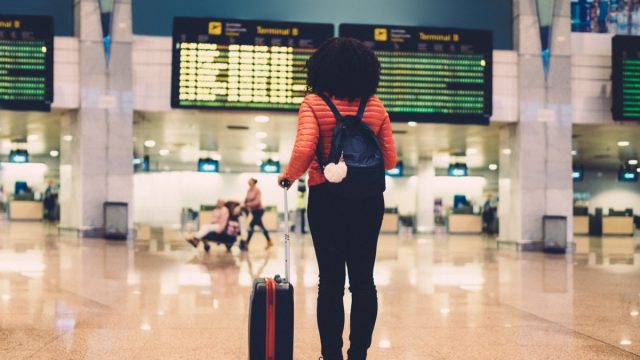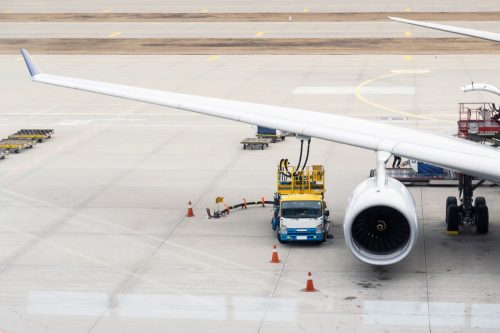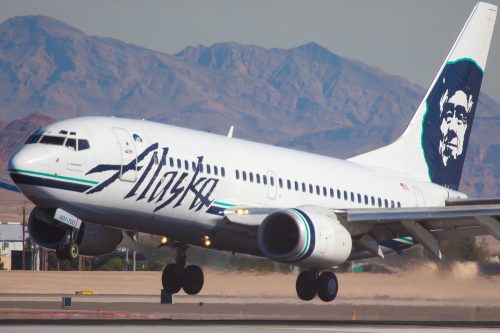Airlines Are Now Warning You to Prepare for Rising Prices—Here’s Why

After two years of grappling with the COVID pandemic, many Americans have finally decided to plan vacations and trips as virus-numbers continue to fall significantly. But what was expected to be an easy rebound year for air travel with COVID-based restrictions and cancellations being lifted might not be that anymore. A new major issue is forcing airlines to take a look at their ticket prices, so you might need to start preparing for the potential of rising costs. Read on to find out why U.S. carriers could end up hiking up fares soon.
RELATED: American Is Cutting Flights From These 4 Major Cities, Starting May 1.
U.S. gas prices have been increasing because of Russia’s attack on Ukraine.

Russia’s continued war on Ukraine has already started to impact the cost of gas. According to the American Automobile Association (AAA), the average price of gasoline hit an all-time high on Mar. 9 at $4.252 a gallon, surpassing the last record set in 2008. But prices could rise even higher soon. President Joe Biden announced on Mar. 8 that the U.S. would be banning all oil imports from Russia in order to target the “main artery” of the Russian economy. But Biden also acknowledged that this decision would likely push gas prices up even more.
“The decision today is not without cost here at home. Putin’s war is already hurting American families at the gas pump,” he said. “Since Putin began his military buildup on Ukrainian borders, just since then, the price of the gas at the pump in America went up 75 cents. And with this action, it’s going to go up further.”
These rising prices are resulting in higher costs for flights, too.

But people in the U.S. might not only start to feel heat at the gas station. Travel experts say that rising oil prices could soon lead to more expensive flights as well. The higher costs “will impact all airlines, at a time when they were starting to see demand return with reducing COVID case counts and fewer border restrictions,” Umang Gupta, managing director at Alton Aviation Consultancy, told Newsweek.
“A 737 right now costs a little over $36,000 to fill up versus $24,000,” Richard Manrgum, an aeronautics professor at Kent State University, further explained to NBC-affiliate WKYC in Cleveland, Ohio. “An even larger aircraft like a 747 going [from] New York to London burns about 21,000 pounds of fuel, which is about $116,000 of gas right now.”
RELATED: For more flight news, sign up for our daily newsletter.
U.S. airlines might have to raise their ticket prices.

As carriers get hit with soaring costs, some experts say it’s not a matter of if U.S. airlines will push off these costs to passengers, but when, and how much. “Airlines are in a difficult position because they don’t want to alienate their customers. If they raise prices to cover the cost of the fuel increase 100 percent, they may be pricing people out of the market,” AAA spokesperson Mark Schieldrop told Travel Off Path. “It’s a fine line airlines have to walk in order to absorb some of the costs, but at the same time, not make flying so expensive that they undermine their business.”
Some carriers in the country might get to bypass raising ticket prices because they use fuel hedging, in which they lock in oil prices with a company for an extended period of time through contract. But according to Reuters, three of the biggest airlines are unhedged: American, United, and Delta. And Breeze Airways, the new low-fare airline from the founder of JetBlue, is one of the first U.S. carriers to directly speak on the potential that it might raise ticket prices for customers soon.
“By passenger, by plane, it generally adds about $5 per passenger per flying hour,” Gareth Edmondson-Jones, director of communication for Breeze Airways, told WKYC. “If its a two-hour trip, an extra $10 in fare. If it’s a four-hour trip, then $20. It’s nothing we really want to do, but ultimately if fuel continues to go up, we’re going to have to amend prices.”
A few carriers have also started to cut flights.

Some airlines have already started paring down their flight schedules in response to the rising fuel prices as well, Bloomberg reported. According to the news outlet, this underscores how Russia’s attack on Ukraine is already affecting the airline industry and jeopardizing the rebound many experts are hoping for this year as the pandemic slows.
Alaska Airlines confirmed it will cut flights by as much as 5 percent due to “the sharp rise in fuel costs,” according to a Mar. 8 regulatory filing, per Bloomberg. Allegiant Airlines is also planning to lower its second-quarter flight capacity between 5 and 10 percent, the carrier’s CFO Greg Anderson said during a Mar. 7 conference.
RELATED: Never Do This When Your Flight Is Canceled, Travel Expert Warns.